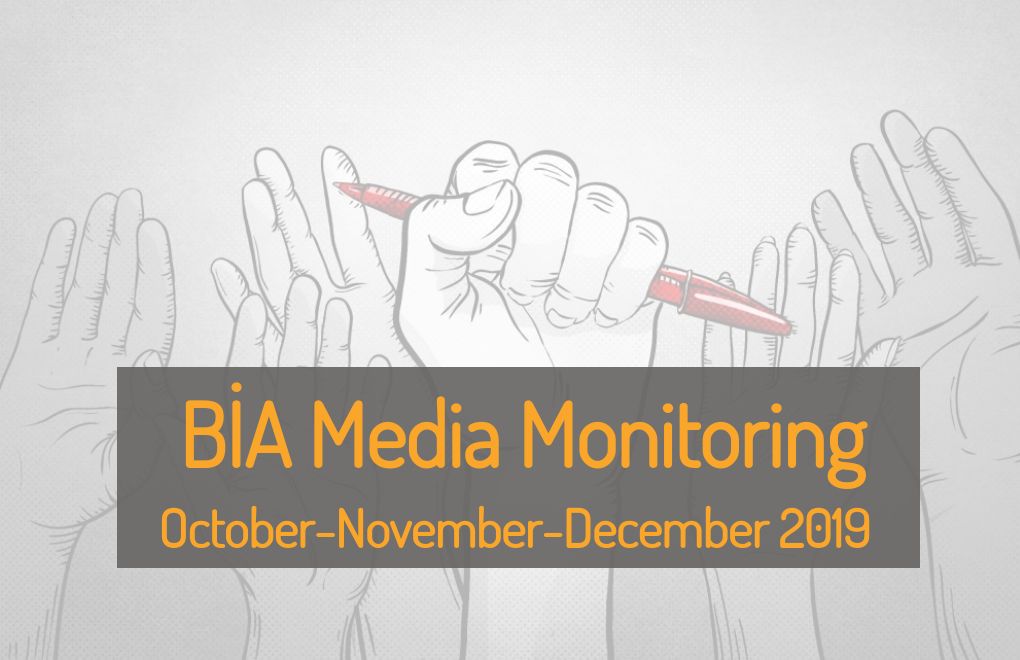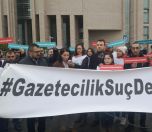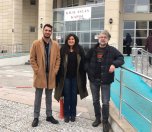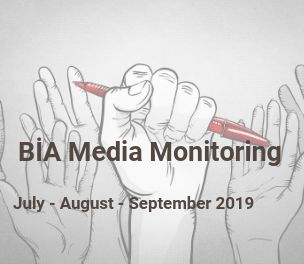Infographic: Yağmur Karagöz
Click to read the article in Turkish / Kurdish
Put into effect by President and ruling Justice and Development Party (AKP) Chair Recep Tayyip Erdoğan and his government, the "judicial reform package" has managed to convince neither the international human rights community, nor the ones struggling for democracy in Turkey.
Covering the period of October-November-December 2019, the BİA Media Monitoring Report shows that at least 251 journalists and media representatives faced the threat of nine aggravated life sentences, 2 thousand 389 years, 1 month in prison and 3 million 30 thousand Turkish Lira (TRY) in damages in total as per the Turkish Penal Code (TCK), Anti-Terror Law (TMK), Law on Capital Market (SPK) and Law on Banking.
In the last three months of 2019, 35 journalists have been sentenced to a total of 157 years, 4 months in prison and a total of 8 thousand 740 TRY in judicial fines as per the TCK and TMK.
At least 61 journalists were given prison sentences, deferred prison sentences or judicial fines in the lawsuits filed as per the Article no. 299 of the TCK, which has been implemented for publications and broadcasts about President and ruling AKP Chair Recep Tayyip Erdoğan since August 2014, when he was elected President. The Constitutional Court has not found this article unconstitutional and the Judicial Reform Package has only introduced a "right of appeal at the Court of Cassation". This article is hovering over freedom of expression as the "Sword of Damocles."
Press Advertisement Institute
In addition to its chapters of "killed journalists", "imprisoned journalists", "assaults, threats", "impunity", "investigations and court cases", "criminal cases and lawsuits for damages on insult-related charges", "bans, closures, seizures", "reporting", Constitutional Court", "European Court of Human Rights (ECtHR)", "Radio and Television Supreme Council (RTÜK)", and "journalists left unemployed", the BİA Media Monitoring Report has now opened a new chapter, namely, the "Press Advertisement Institution", which is heavily criticized by critical newspapers as an instrument of oppression.
The Press Advertisement Institution instrumentalizes the official ads, using them against newspapers. In the period of October-November-December 2019, the Institution was widely discussed as it cut the ads of daily BirGün for 49 days, the ads of daily Cumhuriyet for 19 days and those of Evrensel for 10 days. Yeni Asya newspaper was also requested to make defense.
Detentions
In the period of October-November-December 2019, at least 13 journalists or media workers were detained. Six of these journalists were taken into custody as part of "Kurdish Question"-related investigations. Moreover, the houses of three journalists were searched.
In the same period last year, 12 journalists or media workers were taken into custody. 10 of them were taken into custody as part of investigations related with the "Kurdish Question".
In 2018, 47 journalists were detained; 36 of them were held in custody in security directorates or Anti-Terror Branches after being detained while reporting on "Kurdish Question"-related developments.
Attacks
In this three-month period, nine journalists, four of them in military operation zone, were attacked. While a journalist covering the crisis of horse carriages in İstanbul's Princes' Islands was faced with police violence, journalists were also attacked in the provinces of Ankara, Konya and Iğdır.
In the same period last year, Washington Post columnist Jamal Khashoggi from Saudi Arabia was killed in İstanbul Consulate General of Saudi Arabia. Moreover, journalists Fatih Portakal and Nalin Öztekin as well as Cumhuriyet newspaper and Odatv news website were threatened.
Throughout 2018, 19 journalists and one media organization were assaulted and 70 journalists and 4 media outlets were faced with threats.
201 journalists as defendants
In October-November-December 2019, nine journalists or media representatives faced life sentences aggravated for nine times on charge of "disrupting the unity of the state" as part of journalism or political cases. Eight journalists faced 225 years in prison in total on charges of "espionage" or "obtaining and publishing confidential documents of the state."
108 journalists faced 1,641 years in prison in total on a series of charges including "leading a terrorist organization", "membership of a terrorist organization", "committing crimes on behalf of the organization as a non-member" and "aiding the organization". In these lawsuits, 25 journalists have been sentenced to 147 years in prison in total (in Cumhuriyet, Sözcü, Zaman cases, etc.). While the lawsuits against two journalists were filed in this period, three defendants have been acquitted.
In this period, 50 journalists or media workers faced 316 years, 6 months in total for "propagandizing for a terrorist organization", "reporting on the statements of the organization" and "targeting the ones struggling against terror by revealing their identities." Seven of the lawsuits were new. While five journalists have been acquitted in the end, four journalists have been sentenced to 8 years, 8 months in prison (10 months of which deferred).
In the period of October-November-December 2019, seven journalists faced 14 years in prison for "defaming state institutions". While four journalists have been sentenced to 1 year, 8 months in prison in total (1 year, 3 months deferred; the announcement of 5 months suspended), the lawsuit against one journalist was new. Three journalists faced 15 years in prison in total for "inciting to commit crimes", three journalists are still facing nine years in prison in total for "praising the crime". The one-year prison sentence of one journalist has also been upheld by the Court of Cassation. Two journalists have been facing 6 years in prison in total for "violating the confidentiality of the investigation". While one journalist faced 4 years, 6 months in prison for "inciting the public to enmity and hatred", the five-month prison sentence of another has been upheld by the court of appeal.
Six journalists have been facing 30 years in prison in total for allegedly "violating the Law on Capital Market (SPK)".
Four journalists have been facing 12 years in prison in total for violating the Law no. 2911 on Meetings and Demonstrations.
Taken together, 201 journalists faced life sentences aggravated for 9 times and 2 thousand, 273 years in prison in total on these charges.
The trials of "insult" and "insulting the President" are not included in this calculation of defendants and penalties. When these are included as well, the number of defendants increases to 251 and the total amount of penalties increases to 9 aggravated life sentences, 2 thousand 389 years, 1 month in prison and 3 million 30 thousand TRY in damages.
Insult
In the period of October-November-December 2019, 33 journalists faced 78 years, 9 months in total on charges of "insult", "insulting a public officer" or "defamation". While one journalist has been given a judicial fine of 740 TRY, two journalists have been acquitted and lawsuits against eight journalists were filed in this period.
In the same period, nine journalists and one media outlet faced 3 million 30 thousand TRY in damages on charges of "attack on personal rights" or "insult". While the suit for damages of 50 thousand TRY has been rejected, the suit for damages of 1 million TRY was new. As part of one of these lawsuits, Çiğdem Toker, a former columnist for Cumhuriyet, was faced with a suit for damages of 1 million 500 thousand TRY filed by a company affiliated with Bayburt Group while a suit for damages of 1 million TRY was filed against Hazal Ocak, a reporter for Cumhuriyet, over a news report.
Insulting President Erdoğan
With the announcement that a criminal complaint would be filed against Le Point magazine executives Etienne Gernelle and Romain Gubert over the magazine's cover that said, "The Eradicator" (L'éradicateur), the coverage area of the "insulting the President" regulation exceeded the borders!
In the last three months, a total of eight journalists stood trial for their views and criticism on President Recep Tayyip Erdoğan. Fatih Polat and illustrator Cihan Demirci were acquitted of "insult." Prosecution against Can Dündar, Abbas Yalçın and Sezgin Kartal started in this period.
While trials of Erk Acarer and Ahmet Sever continued in this period, Adnan Bilen was sentenced to pay a judicial fine of 7 thousand lira. Investigations against Hasan Cemal and Haluk Kalafat resulted in a verdict of non-prosecution.
Throughout 2018, 20 journalists were sentenced to a total of 38 years, 5 months and 4 days (6 years, 10 months and 12 days deferred) in prison and to pay a judicial fine of 35 thousand lira upon Article 299 of the Turkish Penal Code.
Censorship on Wikipedia
Eight books were banned, one journalist was banned from international travels, one journalist was subjected to "accreditation discrimination," one TV team was imposed a movement ban, three online news reports and one news report were censored. Although Turkey was convicted by the European Court of Human Rights (ECtHR) over the censorship of Wikipedia, the censorship continued till the end of the year as no authority take action to open access to the site.
Constitutional Court and RTÜK
Announcing its decisions on the applications of 10 people, including seven journalists, and two websites (Yüksekova Haber and Diken), sentenced the state to pay a total of 60,110 lira for compensation. It also ruled that a provision that stipulated the Radio and Television Supreme Council (RTÜK) should issue a broadcast suspension for radio and TV outlets that failed to pay fines violated freedom of expression. The Constitutional Court also ruled that the censorship of Wikipedia, which has been underway since April 29, 2017, violated freedom of expression.
In the same period last year, the Constitutional Court sentenced the state to pay 8,227 lira (including court costs) for compensation as a result of applications by two journalists, one website and one police officer, concluding that freedom of expression was violated.
Throughout 2018, the Constitutional Court sentenced Turkey to pay a total of 135,881 lira for compensation, announcing its verdicts on 18 applications, including applications by 10 journalists, one website and one newspaper. Since the 2016 coup attempt, the top court had been criticized for extending the period of trials that would go against the government's policies.
"Pending" cases at the ECtHR
The ECtHR, announcing its decision on applications by two local administrators and a political activist, who were prosecuted upon the Anti-Terror Law, sentenced Turkey to pay 16,500 euro (104,200 lira) for compensation.
The ECtHR did not give a ruling on applications by journalists regarding freedom of expression. Among those who wait for a decision by the ECtHR, there are journalists Barış Pehlivan and Barış Terkoğlu, who had been arbitrarily arrested for 19 months in the Odatv case, and 46 media employees who stood trial for membership of the Kurdistan Communities Union (KCK). On the other hand, Council of Europe Commissioner for Human Rights Dunja Mijatovic, in the opinion she sent to the ECtHR, criticized Turkey and the Law on Internet for causing censorship.
After the coup attempt, the ECtHR has been criticized extensively for giving a ruling within a long time such as six months or one year in the cases of journalists regarding "freedom and security" and "freedom of expression."
Struggle against impunity: Depends on the case
After the Constitutional Court ruling on the ban on Wikipedia, the Freedom of Expression Association applied to Ankara 1st Penal Court of Peace and said, "Remove the ban immediately."
Five defendants were sentenced to 2 years, 2 months and 20 days in prison for attacking Ahmet Hakan Coşkun in 2015 when he was a columnist for hürriyet newspaper. Two defendants were acquitted.
Ankara Administrative Court overturned a reprimand by the state broadcaster TRT to Haber-Sen Union Secretary-General Burak Ustaoğlu for telling the transformation of TRT under the title, "If the mechanisms that are not being run would be run, TRT becomes the television channel of the people."
In the case of police officer Abdül Köksal, who was dismissed from the profession and stood trial for irregularly wiretapping 70 people, including journalist Haydar Meriç, whose corpse was found on June 18, 2011, the court of appeal overturned the verdict. He will stand retrial for "qualified violation of immunity of domicile" and "membership of an armed terrorist organization."
The Umut (Hope) Case, which also includes the killings of journalists Uğur Mumcu (1993) and Ahmet Taner Kışlalı (1999), is continuing under two separate files, one for Oğuz Demir, who placed a bomb in Mumcu's car, and five other defendants. The Constitutional Court had ruled for the retrial of the five defendants. The bombing of the Özgür Ülke in Kadırga, İstanbul 25 years ago newspaper went unpunished.
RTÜK: Dismissed Bildirici, did not share information
The RTÜK, which dismissed Faruk Bildirici, a member of the council from the CHP, did not share any information on its meetings on sanctions against TV and radio channels.
89 journalists lost their jobs
At least 89 media employees lost their jobs. Demirören Group's Hürriyet newspaper fired dozens of journalists by sending written notifications to their homes and journalists who considered this unethical were forced to resign.
The pro-government Türkmedya Group's Star and Güneş newspapers were closed after they lost the advertising revenue that came from the İstanbul Metropolitan Municipality, which increased concerns regarding further dismissals. This figure was 37 in the same period last year and 157 throughout 2018. (EÖ/APA/SD/VK)















